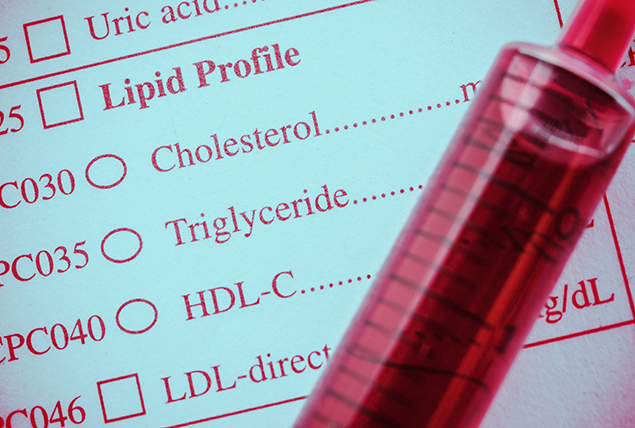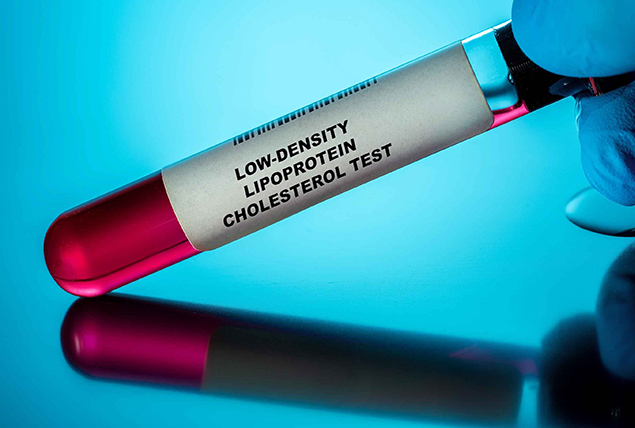Living the Good Life with High Cholesterol

Key Points
- Approaching your high cholesterol diagnosis with a reasonable and sustainable management program can help set you up for greater long-term success.
- It can feel challenging to tell a partner that you need to overhaul your daily habits or make adjustments to your nutrition and activity level.
- It's possible to start a medication, and then adjust the dosage or eliminate it over time if it's determined that lifestyle changes are making a difference.
If you or a loved one were recently diagnosed with high cholesterol, chances are, your lives are about to change. This can be a somewhat confusing and frustrating process, especially if your high cholesterol diagnosis wasn't triggered by any other signs or symptoms.
You look and feel fine, right? So do you really have to change your lifestyle after learning your cholesterol numbers are high?
The short answer is yes, you have to manage your high cholesterol.
Why do you have to change your lifestyle after a high cholesterol diagnosis?
Whether your high cholesterol was detected due to a regular lipid panel conducted by your physician or determined after a more serious condition—like a heart attack or ischemia was detected—expect some big lifestyle changes in your future.
High cholesterol is typically asymptomatic, but that doesn't mean it's benign. In fact, it's a major risk factor for heart disease, strokes and heart attack, according to the Centers for Disease Control and Prevention (CDC).
Failing to make changes to your lifestyle after a high cholesterol diagnosis could be setting yourself up for more serious health problems down the road.
"Your healthcare provider may ask you to make significant changes in your lifestyle, which can be intimidating," said Lauren Munsch Dal Farra, M.D., CEO and cardiologist of PALM Health in Ladue, Missouri.
"The first step will be to assess your readiness to change your lifestyle and identify a few ways you can live a more heart-healthy lifestyle if you're ready. Your diagnosis may also be accompanied by recommendations to start a new medication," Dal Farra said.
Assessing "readiness to change" is an important first step because significantly overhauling your diet and exercise habits, and cutting out vices like smoking or excessive drinking, can feel like too much, too soon.
You'll likely need to work with your doctor to determine which lifestyle factors you can reasonably change and to find the right resources to help you change them with success.
Approaching your high cholesterol diagnosis with a reasonable and sustainable management program will help set you up for greater long-term success.
"As you begin to make lifestyle changes or take a new medication, you can expect to have your blood work repeated a few times over the first year to determine the effectiveness of the lifestyle or medication interventions," Dal Farra said.
These ongoing screenings can help you and your doctor make adjustments to your management plan and assess any other steps you can take along your journey to improve your overall health.
Should you share your high cholesterol diagnosis with your partner?
After learning you have high cholesterol, you may not be quite sure if, when or how to disclose the information to your partner. This may be especially true if you and your partner bond over the lifestyle you currently share.
For instance, eating heavy meals, drinking excessively and spending nights watching Netflix may be much more appealing to you both than taking long walks or hitting the gym. You could consider these activities an essential part of being a couple.
"I recommend communicating a diagnosis of high cholesterol with your partner right away. Your partner can be your biggest supporter. It's essential to share this information with them so they can help you identify ways to change your personal and shared lifestyles and support you through these changes," Dal Farra said.
Even if you're not in a serious relationship, you may want to let your diagnosis dictate your approach to dating. You could search for partners who have a more health-conscious approach to life or look for those who enjoy active dates or cooking healthy meals at home.
There's no shame in disclosing a high cholesterol diagnosis—especially when you consider the significant role that genetics plays in your cholesterol levels—and you'll be more likely to find a partner who is ready, willing and prepared to help support you in your pursuit of health.
"People with good support systems tend to stay on track with new routines and lifestyle changes," said Rathna Nuti, M.D., a board-certified family medicine and sports medicine doctor in Dallas.
Recommended
- The Facts About High Cholesterol: Find out how high cholesterol affects your sexual health.
- A High Cholesterol Level Often Goes Undetected: No set cholesterol level requires medication. Diagnosis and treatment are individual.
- I Had a Mild Heart Attack. Can I Safely Have Sex Again?: An intercourse-induced infarction is rare, but other factors affect post–heart attack intimacy.
What are 5 healthy lifestyle changes to prevent or care for a high cholesterol diagnosis?
If you or a loved one is at risk of a high cholesterol diagnosis, or if you've recently learned you have high cholesterol, the approaches to prevention and care are similar.
This is a good time to take note of the adage, "An ounce of prevention is worth a pound of cure." In other words, you're better off staving off a high cholesterol diagnosis by adhering to a healthy lifestyle than trying to reverse the potential ill effects of a diagnosis after the fact.
The best ways to prevent high cholesterol are the same ones you hear about all the time when it comes to disease prevention: eating healthy, getting and staying active, prioritizing good sleep, cutting out smoking and managing stress.
If your health habits are fairly poor across the board, overhauling everything at once may be too overwhelming. Start by changing one or two factors in a way that you find sustainable, and gradually make healthful adjustments over time.
Dal Farra suggests the following approaches:
1. Eat a heart-healthy diet
This includes eliminating trans fats, reducing the intake of saturated fats, increasing soluble fiber intake, eating foods rich in omega-3 fatty acids (like salmon, walnuts and flax seeds), eating less refined sugar and keeping alcohol intake to moderate levels.
"Trans fats are also labeled 'partially hydrogenated vegetable oil.' They're often found in store-bought cookies, cakes, pastries and crackers," Dal Farra said. "Saturated fats are found primarily in red meat, frankfurters, deli meats, cheeses and full-fat dairy products."
2. Exercise regularly
"Everyday movement is essential for maintaining a healthy weight, lowering cholesterol and optimizing your overall quality of life," Dal Farra said.
She acknowledges that adhering to regular activity can be a tough adjustment for many people, which is why she suggests aiming for 30 minutes almost every day, but if needed, it's fine to start with shorter intervals of 5-10 minutes.
"In addition to focused exercise, look for ways to incorporate more movement into your daily routines, such as using the stairs instead of taking the elevator," she said. "Take walks during breaks at work. Work up to exercising five days a week, including at least 20 minutes of vigorous activity at least three times a week."
3. Get high-quality sleep
"Several studies have linked short-term sleep deprivation with well-known risk factors for heart disease, including higher LDL cholesterol (low-density lipoproteins—or 'bad' cholesterol—that contributes to plaque buildup in the arteries and veins), higher triglyceride levels and high blood pressure," Dal Farra said.
"Lack of sufficient sleep also disrupts hormones that control hunger and appetite, resulting in increased hunger, cravings and daytime fatigue, discouraging you from exercising and causing you to eat more."
4. Stop smoking
We all know smoking is bad for you. But it's not just bad for your lungs.
"Smoking raises 'bad' cholesterol levels, lowers 'good' cholesterol levels and damages the linking of the arteries promoting the buildup of cholesterol into plaque and blockages," Dal Farro said.
Of course, quitting smoking isn't an easy process. Dal Farro suggested talking with your healthcare provider to come up with a reasonable plan for quitting, which may include nicotine replacement or medications.
5. Manage your stress levels
High stress is related to numerous negative health outcomes. Dal Farro specifically pointed to inflammation, weight gain and obesity.
"Breathing exercises, meditation, growth in self-awareness and wellness therapies such as infrared saunas, salt rooms, cryotherapy and acupuncture can be beneficial in supporting stress reduction," she said.
Can you take medication for high cholesterol?
In addition to lifestyle changes, your doctor may want you to start taking a cholesterol-lowering medication. This may be necessary, as the ability to manage high cholesterol with lifestyle changes alone varies from person-to-person, and is impacted by other factors such as genetics and other health conditions.
"The ability to regulate cholesterol levels with only a healthy lifestyle varies from person to person and is significantly influenced by a person's genetics. Some people can avoid medications by adopting a heart-healthy lifestyle and others have high cholesterol despite living a very heart-healthy life," Dal Farro said.
"It depends on the willingness of a person to make successful lifestyle changes, their genetic risk factors and what other conditions and heart health risk factors a person is coping with, such as obesity, diabetes and high blood pressure," Dal Farro finished.
It's also important to note that it's possible to start a medication, and then adjust the dosage or eliminate it over time if it's determined that lifestyle changes are making a difference.
"Medication dosage is based on lab work typically done every three to four months," Nuti said. "Adjustments can be made based on evidence presented through blood work."
How do you support someone with a high cholesterol diagnosis?
If you have a loved one who was recently diagnosed, you may have a lot of questions and, more importantly, you might be looking for ways to proactively support them in their quest to make healthy changes.
This support may look different depending on the role you play in their life and how they feel about sharing everything about their diagnosis.
Here are some suggestions from Dal Farro and Nuthi that may help you achieve greater success long-term:
- Practice active listening, particularly if or when they're voicing concerns and thoughts about their diagnosis and the changes they're trying to undertake.
It's important that they feel safe expressing their feelings and that you're showing that you're working to understand how they feel.
- Help them decide which areas of healthy lifestyle change they're willing and able to undertake.
"You can work with them on creating a pro/con list to identify the positive and negative outcomes of making lifestyle changes and the positive and negative aspects of not making any changes," Dal Farra said. "This can help build self-awareness and motivation, an essential step in changing behaviors."
- Respect the choices they make.
"Know when to give another person space if they're not ready to make lifestyle changes," Dal Farra said. "Resist passing judgment on their thoughts, feelings, attitudes and behaviors."
- Be encouraging, show affection and be kind.
Change isn't easy. It requires long-term commitment and may be accompanied by forward and backward progress. Celebrate the small wins.
- Join them in their journey whenever you can.
"It's more fun to have a partner for walking, hiking or other exercise options. You could take a cooking class together to learn healthier food choices and dishes, for example," Nuti said.
It's harder to stick to major changes to diet or exercise if you're the only one in the family making the changes, so be conscientious and supportive through your actions, not just your words.
Helpful resources for managing high cholesterol
Your primary care physician or cardiologist is your first line of education and resources when it comes to managing high cholesterol. This is especially important when coming up with your personal management plan and determining what changes you're going to make.
Based on your plan, your doctor may also suggest more specialized healthcare-related providers like dietitians, personal trainers or therapists who can help with stress management.
Doctors and clinicians aren't your only options, though. High-quality online resources can also help you make positive changes. Consider websites such as the American Heart Association and here on Giddy.


















